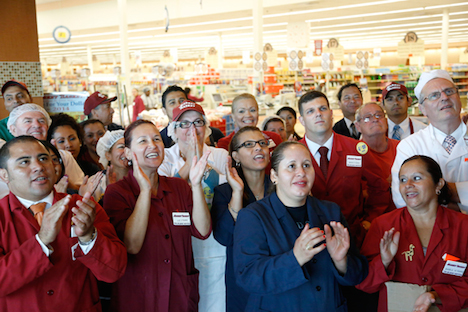Who knew that one of the best made-for-Labor Day speeches in American history would be delivered by a CEO? And who could have guessed that the summer’s major labor story would not be about a CEO saving the jobs of his workers but about the workers saving the job of their CEO? This is the wonder of the happy-ending tale of Market Basket, the New England grocery chain. Most of its 25,000 non-unionized workers walked out to get their deposed CEO, Arthur T. Demoulas, reinstated as the company’s leader. Last week, they won. It’s a story that makes you wish Frank Capra of “It’s a Wonderful Life” fame were still with us. Jimmy Stewart, who played George Bailey in that excellent parable, would be ideal as Arthur T. He is called that because his main rival is his cousin, Arthur S. Demoulas. Arthur S. thought that Arthur T.‘s pro-worker, pro-consumer approach was cutting into the family’s profits. When Arthur S. gained enough sway over the company because one relative switched sides, he arranged for Arthur T. to be fired. At this point, you can cue in Aaron Copland’s “Fanfare for the Common Man.” First, as my colleague Harold Meyerson reported in an excellent column on Market Basket earlier this summer, eight senior managers organized an employee protest. They were quickly fired. Then all hell broke loose. The lion’s share of the employees at the chain’s 71 stores joined the protest, fully aware that they had no job protection. Market Basket’s customers (there is great affection for the chain) were drawn to the workers’ side. This worker-consumer alliance bore fruit last week when a $1.5 billion deal was arranged under which Arthur T. assumed control of the company, which has annual revenues of $4.6 billion. At this point in our film, we might well want a rendition of “Happy Days Are Here Again.” There is one potential catch: Getting the deal done will require, as The Boston Globe put it, “a boatload of borrowed cash,” which will put pressure on Market Basket’s bottom line. But the Globe also concluded that the agreement “is more or less in line with the company’s earnings and long-term potential.” The outcome set up Arthur T.‘s extraordinary speech last Thursday outside the company’s headquarters in Tewksbury, Mass., expressing his gratitude toward the workers. He pronounced himself in “awe of what you have all accomplished.” And here is the part of the sermon that should be played regularly at both business schools and divinity schools—to business students because it shows that a CEO who acknowledges all stakeholders and not just shareholders can be successful, and to divinity students because it recognizes the inherent dignity of every human being. “In this organization, here at Market Basket, everyone is special,” Arthur T. declared. “You have demonstrated that everyone here has a purpose. You have demonstrated that everyone has meaning. And no one person is better or more important than another. And no one person holds a position of privilege. Whether it’s a full-timer or a part-timer, whether it’s a sacker or a cashier, or a grocery clerk, or a truck driver, or a warehouse selector, a store manager, a supervisor, a customer, a vendor or a CEO, we are all equal. We are all equal and by working together, and only together, do we succeed.” Thomas Jefferson, meet Arthur T. Now I can hear my Marxist friends objecting that Arthur T. is engaging here in what they might call “mystification.” Obviously, one lesson of this episode is that not everyone is equal when it comes to decision-making. The owners of a company have power that its workers don’t. This turned out as it did only because Arthur T. could buy out Arthur S. It’s why we still need unions and other forms of collective representation for employees. Not every CEO, alas, is like Arthur T. But this story is also an instance where workers coming together could wield more power than they imagined they had. And what’s so compelling about Arthur T.‘s speech is its specificity. Naming those sackers and clerks and truck drivers and all the others who contributed to Market Basket’s success was his way of asserting a capitalist version of the labor theory of value: Without good workers, the “job creators” can’t make it. St. John Paul II, a great friend of labor, preached “the primacy of man in the production process, the primacy of man over things.” The primacy of human beings over things is what we celebrate on Labor Day. Arthur T. gets it. Source URL |
